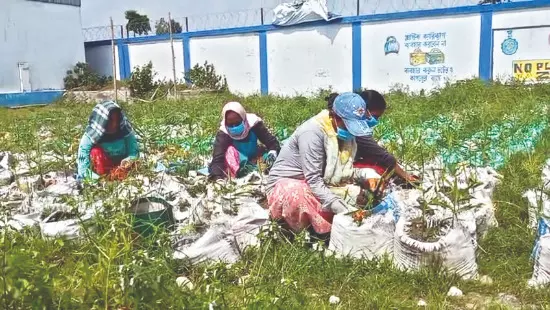Kalimpong: Fungal disease hampers ginger cultivation

Jalpaiguri: Ginger cultivation in the Kalimpong hills has taken a serious hit this year due to a widespread outbreak of soft rot, a fungal disease that has forced many farmers to abandon the once-profitable crop. In contrast, farmers in the Khagrabari-II Gram Panchayat (GP) area of Maynaguri, Jalpaiguri district, have reported notable success in ginger farming by utilising vacant land and organic methods.
According to James Lepcha, Deputy Director of Agriculture, Kalimpong district, soft rot began affecting ginger crops during the monsoon months of July and August last year. The combination of heavy rainfall and intense sunlight created ideal conditions for the disease to spread, resulting in crop damage across more than 400 hectares of the 1,200 hectares under ginger cultivation.
Lepcha said: “Ginger, cardamom, broom grass, cinnamon and black pepper thrive in the hilly terrain. However, last year’s fungal outbreak severely impacted ginger farming. We are actively researching disease control measures. Due to reduced farmer interest, ginger cultivation in Kalimpong has declined to 850 hectares this year.”
He added that with the onset of summer heat in June, the risk of another outbreak remains if July and August bring similar weather conditions. “We’re closely monitoring the situation. If we can contain the disease this year, we aim to increase cultivation to 1,000 hectares next season.”
While the hills struggle, farmers in Jalpaiguri’s Khagrabari-II Gram Panchayat have turned adversity into opportunity. After the success of a local Solid Waste Management Project, they began using unused land for ginger cultivation. Around 3,000 ginger saplings were planted, nourished with organic compost produced from the waste management initiative. Panchayat member Bablu Roy said: “The plants are thriving, thanks to the organic methods we’ve adopted. This not only utilises vacant land but also promotes sustainable farming.”
Gopal Saha, Deputy Director of Agriculture for Jalpaiguri, praised the initiative. “We’re encouraging other Gram Panchayats in and around the Dooars region to replicate this model. It will not only boost local ginger production but also help stabilise market prices and enhance the revenue of rural bodies.”



